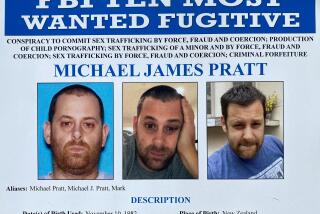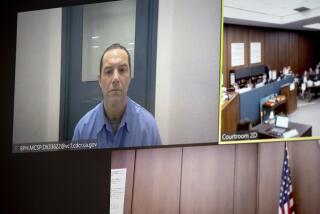Prosecutors Defend Case Against Ex-Black Panther
- Share via
A controversial witness against Elmer “Geronimo” Pratt is only one element in a strong murder case against the former Black Panther Party leader, prosecutors argued Tuesday.
Pratt’s attorneys, however, countered that the prosecution cannot distance itself from Julius Carl “Julio” Butler, a witness Orange County Superior Court Judge Everett W. Dickey said had lied when he testified that he had never been an informant for law enforcement.
Butler, a former Los Angeles County sheriff’s deputy and onetime Panther, testified that Pratt had confessed the crime to him--an assertion Pratt has always denied.
Dickey reversed Pratt’s murder conviction last year. He ruled Butler was an informant and said that prosecutors had suppressed this crucial evidence, which would have been favorable to the accused man. He later released Pratt on bail.
Los Angeles County Dist. Atty. Gil Garcetti has appealed Dickey’s decision, and a three-judge panel of the California Court of Appeal in downtown Los Angeles heard oral arguments in the case Tuesday.
Pratt was found guilty of slaying schoolteacher Caroline Olsen and critically wounding her husband, Kenneth, during a 1968 robbery that netted $18 on a Santa Monica tennis court.
Pratt served 25 years in prison and two years in jail awaiting trial before his conviction was overturned. His attorneys said Tuesday that they hoped “the 27-year trail of injustice” that has followed him is coming to an end with Garcetti’s appeal.
A few dozen of Pratt’s supporters packed the courtroom and rallied outside the Ronald Reagan Building in downtown Los Angeles, where the appellate court is located.
Pratt, who arrived in Los Angeles on Monday evening from his home in Louisiana, was present at the hearing--as were actors Marlon Brando and Sean Penn, who believe that Pratt is innocent.
Outside court, Brando said: “A district attorney with political ambitions sees fit to do something that is incredible . . . send a man back to prison for a crime he obviously didn’t commit.”
Tuesday’s prosecution arguments were similar to those rejected by Dickey. Prosecutors argued that even without Butler’s testimony, evidence points to Pratt’s guilt.
“This case does not involve the trial of Julius Butler,” Deputy Dist. Atty. Harry B. Sondheim told the justices.
Sondheim argued that in an earlier effort by Pratt to have his conviction reversed, the same 2nd District Court of Appeal ruled in 1980 that Butler had not been an informant.
He said Dickey was wrong when he stated that the prosecution did not have a strong case without Butler’s testimony.
Pratt has maintained from the outset that he was in the Bay Area attending Black Panther Party meetings when the Olsens were shot--a contention supported by retired FBI Agent M. Wesley Swearingen, who said the bureau knew he was in Oakland because Pratt was under surveillance.
Stuart Hanlon, one of Pratt’s attorneys, said that once evidence began to emerge after Pratt’s conviction about Butler’s informing activities, prosecutors began trying to distance themselves from their star witness.
He said Pratt’s prosecutor showed how important he saw Butler’s testimony at the 1972 trial. He quoted the prosecutor, who is now Superior Court Judge Richard P. Kalustian, as saying that “if the jury believes Butler, Pratt is guilty. The case is over.”
Another Pratt attorney, Mark D. Rosenbaum of the American Civil Liberties Union Foundation of Southern California, told the justices that they only had to determine if, based on false or suppressed evidence that Butler was an informant, “is there a reasonable expectation that the result would have been different? Is confidence in the verdict [convicting Pratt] undermined?”
He challenged prosecutors to explain to the court why index cards in a district attorney’s office file listing Butler as a confidential informant in January 1972--six months before Pratt’s trial-- were not turned over to the defense at the original trial.
The appellate court panel--justices Vaino Spencer, William A. Masterson and Miriam Vogel--had no questions.
Outside court, Hanlon was confident that “there is no way in the world that [the appellate court] is going to put Geronimo back in prison.”
But Pratt was more cautious, saying: “When it comes to this so-called arena, I never know what will happen.”
Staff writer Patt Morrison contributed to this story.
More to Read
Sign up for Essential California
The most important California stories and recommendations in your inbox every morning.
You may occasionally receive promotional content from the Los Angeles Times.













